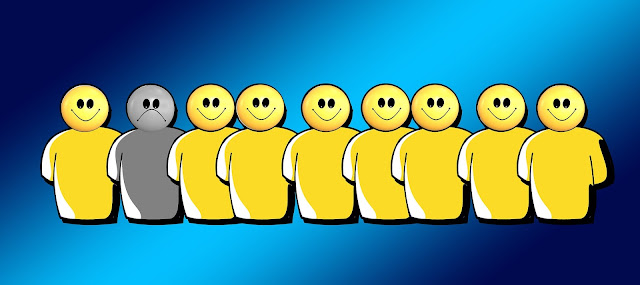The "Us" & "Them" Conflict
Let's talk groups. Clubs, religions, sports fans, etc. Why do we have these separations in our lives? Holding a barrier in-between everyone. Are they important? Do we need these things to grow as a society? Let's find out.
Many people live in insular worlds made up of "us" and "them."
The us people are more comfortable when they are among those with whom they share common backgrounds, customs, traits and values. When they are among the them people, they may feel a sense of unease, even of estrangement.
The us people might say that they bear no ill-will or prejudices towards the them folks. The would explain that the them may be perfectly nice individuals, but "they're just very different." from the us.
The them and the us might live in the same towns, go to the same schools or colleges. They might work in the common businesses, offices, or factories, and they might enjoy similar recreational activities. But the them will seldom be included in the us home.
Of course, who is deemed us or them is in the eye of the beholder. The aforementioned us might be considered as them by the previous them, who see themselves as the "real" us. And again, the them would decidedly not be included under the new us's insular roof.
Are you confused yet? It is confusing, but if you're able to keep up, you know what I'm talking about. Just think back to high school. A perfect example of an insular society. Jocks, nerds, cool kids, pranksters, teachers, students. The barriers are everywhere. All you have to do is open your eyes a little and look around to notice it.
There's an insightful book by Hugh McClennan, Two Solitudes, that talks about different cultures living "together but separately" in a quietly strained status quo. Further down that slope lie prejudice, xenophobia, and animosity between the us and the them, all too often seen nowadays.
People tend to be clannish and gravitate to their own group. As Anita sang in "West Side Story," "Stick to your own kind, one of your own kind!" (Fun fact: I'm a huge Broadway junkie) There are numerous simmering conflicts between "different kinds" within neighborhoods of a city or country, and kept fairly dormant. But they can metamorphose into hostilities and violence between angry groups of people, as we are also witnessing today.
Bitter conflicts between us people and them people have been occurring since the appearance of our species on Earth, and the resultant bloodshed, loss of life, and immense emotional pain are increasing in this world of "isms" and advanced weaponry.
The separation into warring groups is particularly remarkable now, given compelling scientific evidence showing how closely we resemble one another.
Genetic studies indicate that the complex genomes of different races, languages and cultures are strikingly similar in structure of genes and chromosomes. Biological studies show that cellular and bodily functions are virtually identical. Social sciences indicate that diverse human beings are similar in their needs for family, friends and community, aspirations for stability, and needs for beliefs or spirituality.
Homo sapiens are one of the most social species on this great blue and green marble. We thrive on caring, camaraderie, love, and community. Yet, we humans have forever been in conflict on small and large scales with our biggest enemies: ourselves. We have the wherewithal to annihilate each other and erase humans from the face of the Earth. As the cartoon character "Pogo" famously said:
We have so often disregarded our commonalities and concentrated on our differences, and we've erected barriers based on misinformation and prejudice. Schisms between us people and them people have been played out countless times.
When will we ever learn? Sciences and ethics indicate that we can become a unified community of generic people, diverse but equal. This is also in our best interests people:
Our very survival depends on our living together in harmony. If we put our gifts of human intelligence and creativity to work in the service of improving our empathy, communication and our emotional footprint, our species will thrive.
You know what they say about goldfish: If you keep it in a small bowl, it has no room to grow. Think about it. I'll see you tomorrow.
Buh-bye.





Comments
Post a Comment